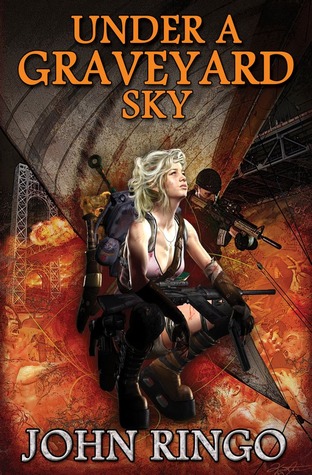
All things considered - and it definitely did have its flaws - Under a Graveyard Sky was probably one of the better apocalyptic tales I've read in a long time, and certainly one of the best zombie tales in recent memory. Rather weak and unbelievable in terms of characters, but very strong in terms of action and plot, John Ringo has pulled together a novel that is sure to please his fans, and potentially win him some new ones.
The book starts on an awkward note, plunging us right into the action, without so much as an introduction to the characters involved. It was so disconcerting that I nearly abandoned it, but the way in which Ringo approached the situation intrigued me. He puts the fate of the world not in the hands of the military or the authorities, but in an investment bank and a well-connected family of 'preppers'. I'm sure there's a socio-political statement there for Ringo, and the bank's resources stretch the bounds of credibility somewhat, but it's an interesting approach that actually makes a lot of sense, once the shock factor wears off.
It's that family which introduces the primary weakness, however, particularly thirteen-year-old Faith the Zombie Slayer. Seriously, you might as well call this girl the next chosen one, except she's all about the high-powered assault weapons instead of the stakes and crossbows. It's ludicrous how well prepared she is, and the ease with which she wades into danger and so gleefully delivers death to the infected is over-the-top and then some. There's actually a point where another character is shot down when he assumes her dad must have been a Buffy fan. She's a likable enough character, and could definitely work in a supernatural setting, this is a book that's deliberately grounded in realism - so much so that Ringo constantly reminds us that the zombies are dangerous, incurable, infected human beings . . . not the living dead.
The zombies themselves are part of what I really liked about the book. There's no supernatural or mystical element here. The zombies are the product of a man-made virus, deliberately designed to be both air-borne and blood-borne for maximum dispersal. It turns its victims into raging, mindless, homicidal maniacs with a hunger for human flesh. There's no cure, and no halting its spread. Although the bank has managed to develop a vaccine by harvesting the spinal cords of living zombies, they are only good for about a dozen doses each.
The first half of the book details the initial spread of the zombie outbreak, with life struggling to continue as normal for as long as possible. We see the police struggle to deal with a situation using tasers and batons, when deadly force is the only real option, while the government limits itself to identifying the source of the plague, rather than curing it. It's a slow descent into madness for civilization, with the first half of the book ending in a brutal bloodbath at a drug-fueled endless rave in Washington Square Park. It's so surreal that it seems plausible, and it makes for fantastic transition to the second, post-apocalyptic half of the novel.
The second half of the book has a far slower pace, and really lacks the sense of urgency that comes from trying to escape impending doom, but it's where the story really develops. Faith and family set out to sea, where they search for other boats and ships to cleanse, rescue, and recover. As if battling zombies weren't tough enough, imagine doing so in the dark, claustrophobic depths of strange ships, adrift at sea. It makes for some great reading, and evolution of their makeshift civilian navy is really interesting to watch develop. Here's where the book is its most political, in discussing how to best organize and implement a new regime, with a lot of dialogue about historical precedent that comes close to being tedious, but is smartly resolved just in time.
That brings us to the final flaw of the novel - basically that it just stops. There is a climactic set-piece to rival the rave in Washington Square Park, appropriately described by one of the characters as Resident Evil: The Cruise Ship, but it doesn't actually resolve anything. The reluctant arrival of the remnants of the US navy is a nice twist, particularly with them unable to do anything more than watch and advise, but all that really does is plant some seeds for the second book - nothing has been accomplished or resolved. There's no cliffhanger either (Ringo manages to avoid that source of reader wrath), but it does feel very much like an unfinished tale.
All things considered, Under a Graveyard Sky was an enjoyable take on the zombie apocalypse. So long as the second book makes some attempt to deal with Faith's impending breakdown, delivers on the promise of multinational intrigue, resolves the 'lost' storyline of Steve's brother and the exodus of investment bankers, and doesn't jump the shark on the zombie infestation, we could be in for a good series.
Published September 3rd 2013 by Baen
Hardcover, 384 pages




